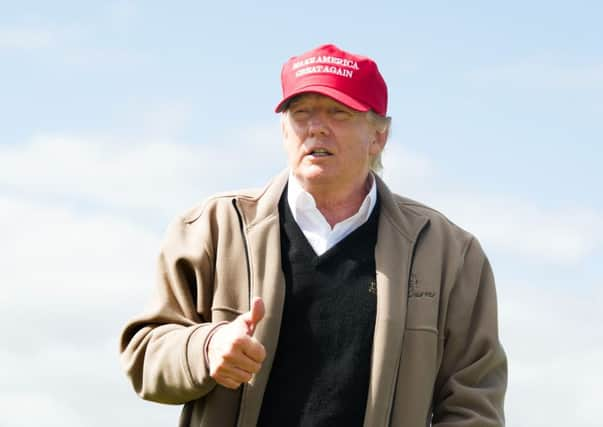Bill Jamieson: Investors exposed to presidential race
This article contains affiliate links. We may earn a small commission on items purchased through this article, but that does not affect our editorial judgement.


UK investors may feel the outcome of the most fiery US presidential election in memory has little consequence for them. But they are more exposed to this most bitter of battles than they realise.
The blow to Hillary Clinton’s prospects late last week with the FBI re-opening its investigations into her use of a private email server sent ripples across the US bond market. And the prospect of an election result closer than expected begs searching questions as to whether America’s highly charged political atmosphere will settle down after the vote.
Advertisement
Hide AdAdvertisement
Hide AdMeanwhile the prospect that Donald Trump could even steal a last-minute victory will appal many who find his personal conduct and bombastic manner beyond the pale. Yet a Trump presidency may not prove the investment “no-go area” many assume.
So what? Many believe whoever wins won’t impinge much on a diversified, broad-based investment portfolio dominated by the big global funds and trusts. But according to the Association of Investment Companies (AIC), investment trusts in the global sector have an average of 36 per cent invested in US shares, exceeding the 22 per cent committed to the global equity income sector.
The Edinburgh-based Martin Currie Global Portfolio has the highest US exposure at 59 per cent. Manager Tom Walker notes that the US economy has the best growth outlook of all developed market countries over the next few years. He expects Democrat hopeful Hillary Clinton will emerge as the “status quo” candidate winner when the result election is announced on 9 November.
Paul Niven, manager of the £2. 8 billion Foreign & Colonial investment trust, has a 38 per cent US allocation, and believes (this prior to the latest email row twist) that a Clinton win is likely. The Witan Investment Trust has a quarter of its £1.9 billion portfolio in the US, while the Mid Wynd International trust has a 49 per cent exposure to US equities. Fund manager Alex Illingworth says “a continuation of Obama policies, which Hillary Clinton appears to mostly offer, would be preferable”.
There seems little sign, then, of expectation of a Trump victory, still less any appetite for one. The widespread expectation is that a Trump triumph would see an immediate sell-off in US equities: some analysts calculate an 8 per cent fall, more than wiping out the 5 per cent gain in the S&P500 this year. But what happens then? There is a case that US shares would then start to look very attractive in the light of Trump’s stated infrastructure and fiscal expansion plans. Garry White, chief investment manager at wealth manager Charles Stanley, points to Trump’s statement that no business should pay more than 15 per cent of their business income in taxes. Currently the US corporate tax rate is 35 per cent.
On personal tax rates, Trump has said he would reduce taxes across the board and especially for working and middle income Americans who, he claims, would receive a “massive” tax reduction. And then there is a big boost for infrastructure spending to which both candidates are committed. How far either candidate could go with such spending ambitions would be constrained by America’s twin deficits on deficit and debt.
But it is a reminder that Trump is no “conservative austerity” candidate and leans heavily towards tax reduction. And any sell-off in the wake of a Trump victory, White argues, would be a bargain-hunting opportunity. A Trump win still looks an unlikely outcome. But for now there is some good news to ponder.The US economy is performing rather better than the vicious presidential contest would suggest.
It grew at its strongest pace in two years in the Q3, according to government figures released last Friday. US Gross Domestic Product grew at an annual rate of 2.9 per cent in the July-September quarter. This was better than expected and has worked to calm fears that the world’s biggest economy was flat-lining – and this despite years of ultra-low interest rates and monetary stimulus.
Advertisement
Hide AdAdvertisement
Hide AdGrowth in GDP has been stuck below 2.7 per cent for the previous seven quarters. But unemployment has tumbled from its 10 per cent level in the 2009 financial crisis to 5 per cent now. In the latest survey, strong exports featured, together with middling consumer spending and weak business investment.
Meanwhile a Clinton victory would be likely to see early action on stimulus if only to help cool the passions that this ferocious presidential campaign has stirred. And, politically at any rate, America is in need of a big chill.